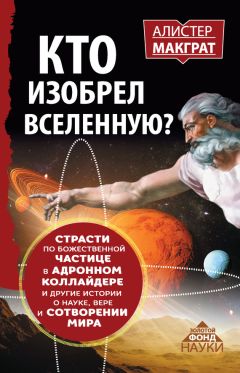Алистер Макграт - Кто изобрел Вселенную? Страсти по божественной частице в адронном коллайдере и другие истории о науке, вере и сотворении мира

Помощь проекту
Кто изобрел Вселенную? Страсти по божественной частице в адронном коллайдере и другие истории о науке, вере и сотворении мира читать книгу онлайн
302
Peter Medawar, «Critical Notice», «Mind» 70, no. 277, 1961, pp. 99–106.
303
Peter Medawar, «Advice to a Young Scientist», New York: Harper & Row, 1979, p. 101.
304
Peter Medawar, «The Limits of Science», Oxford: Oxford University Press, 1985, p. 66. О влиянии Поппера на Медавара см. Calver, «Sir Peter Medawar», pp. 301–14.
305
Medawar, «The Limits of Science», p. 66.
306
Ludwig Wittgenstein, «Notebooks 1914–1916», Chicago: University of Chicago Press, 1979, 74e (запись за 7 августа 1916 года).
307
Terry Eagleton, «Lunging, Flailing, Mispunching: A Review of Richard Dawkins’ “The God Delusion”», London Review of Books, 19 October 2006.
308
William Ralph Inge, «Faith and Its Psychology», New York: Charles Scribner’s Sons, 1910, p. 197.
309
См., например, Phillip R. Shaver, Mario Mikulincer (eds), «Meaning, Mortality, and Choice: The Social Psychology of Existential Concerns», Washington DC: American Psychological Association, 2012; Joshua A. Hicks, Clay Routledge (eds), «The Experience of Meaning in Life: Classical Perspectives, Emerging Themes, and Controversies», New York: Springer, 2013.
310
William James, «The Will to Believe and Other Essays in Popular Philosophy», New York: Longmans, Green, and Co., 1897, p. 62.
311
Viktor E. Frankl, «Man’s Search for Meaning», New York: Simon and Schuster, 1963. Биография Виктора Франкла – Anna Redsand, «Viktor Frankl: A Life Worth Living», New York: Clarion Books, 2006.
312
См., например, B. G. Skaggs and C. R. Barron, «Searching for Meaning in Negative Events: Concept Analysis», «Journal of Advanced Nursing» 53, no. 5, 2006, pp. 559–70.
313
Susan Folkman, «The Case for Positive Emotions in the Stress Process», «Anxiety, Stress, & Coping» 21, no. 1, 2008, pp. 3–14.
314
Roy F. Baumeister, «Meanings of Life», New York: Guilford Press, 1991; Michael J. MacKenzie and Roy F. Baumeister, «Meaning in Life: Nature, Needs, and Myth», в сб. «Meaning in Positive and Existential Psychology», ed. Alexander Batthyany, Pninit Russo-Netze, New York: Springer, 2014, pp. 25–38.
315
Martin Seligman, «Flourish: A Visionary New Understanding of Happiness and Well-Being», New York: Simon & Schuster, 2011. См. также Richard M. Ryan and Edward L. Deci, «On Happiness and Human Potentials: A Review of Research on Hedonic and Eudaimonic Well-Being», «Annual Review of Psychology» 52, 2001, pp. 141–66.
316
Alexander Rosenberg, «The Atheist’s Guide to Reality: Enjoying Life without Illusions», New York: W. W. Norton, 2011, pp. 7–8.
317
Ibid., p. 92
318
Muriel Rukeyser, «The Speed of Darkness», 1968.
319
Подробный и глубокий анализ этого сочинения см. в книге Michael D. Aeschliman, «The Restitution of Man: C. S. Lewis and the Case against Scientism», Grand Rapids, MI: Eerdmans, 1998.
320
Roger Scruton, «Scientism in the Arts and Humanities», The New Atlantis, no. 40, Fall 2013, pp. 33–46.
321
Rosenberg, «Atheist’s Guide to Reality», pp. 110–11.
322
Ibid., pp. 162–163.
323
Timothy Williamson, «What Is Naturalism?», New York Times, 4 сентября 2011. Разбор его собственных взглядов см. в книге Timothy Williamson, «The Philosophy of Philosophy», Oxford: Blackwell, 2007.
324
Timothy Williamson, «On Ducking Challenges to Naturalism», New York Times, 28 сентября 2011 года.
325
Впервые на это указал Дэвид Юм: никакого, сколь угодно большого количества наблюдений недостаточно, чтобы сделать бесконечно общий вывод, который можно защитить логически, поскольку в будущем всегда могут появиться наблюдения, которые его опровергнут.
326
См. Bryan Magee, «Confessions of a Philosopher: A Journey through Western Philosophy», London: Phoenix, 1998, pp. 42–68.
327
Richard Dawkins, «A Devil’s Chaplain», London: Weidenfield & Nicholson, 2003, p. 34.
328
Rutledge M. Dennis, «Social Darwinism, Scientific Racism, and the Metaphysics of Race», «Journal of Negro Education» 64, no. 3, 1995, pp. 243–52; Edwin Black, «War against the Weak: Eugenics and America’s Campaign to Create a Master Race», Westport, CT: Dialogue Press, 2012.
329
Яркий пример – Laurence R. Tancredi, «Hardwired Behavior: What Neuroscience Reveals About Morality», New York: Cambridge University Press, 2005.
330
«Harris continues to defend this view», http://www.huffingtonpost.com/sam-harris/in-defense-of-torture_b_8993.html
331
Sam Harris, «The End of Faith: Religion, Terror, and the Future of Reason», New York: W. W. Norton & Co., 2004, pp. 52–3.
332
Sam Harris, «The Moral Landscape: How Science Can Determine Human Values», New York: Free Press, 2010.
333
Ibid., pp. 48–9.
334
Ibid., p. 21.
335
См., например, труды Джона Готтингема, который воздает должное Фрейду с его идеей, что поведение человека по большей части управляется действием бессознательных сил, не поддающихся логике. См. Nafsika Athanassoulis, Samantha Vice (eds), «The Moral Life: Essays in Honour of John Cottingham», London: Palgrave, 2008.
336
Harris, «The Moral Landscape», p. 19.
337
Классическое исследование, результаты которого были многократно воспроизведены, – Harold G. Koenig, Harvey J. Cohen, «The Link between Religion and Health: Psychoneuroimmunology and the Faith Factor», Oxford: Oxford University Press, 2002.
338
См. Whitley R. P. Kaufman, «Can Science Determine Moral Values? A Reply to Sam Harris», «Neuroethics» 5, no. 1, 2012, pp. 55–65.
339
Анализ моральных трудностей, связанных с этим этическим по сути своей вопросом, см. в работе Govind Persad, Alan Wertheimer, Ezekiel J. Emanuel, «Principles for Allocation of Scarce Medical Interventions», «The Lancet» 373, no. 9661, 2009, pp. 423–31.
340
Kaufman, «Can Science Determine Moral Values?», p. 59.
341
См., например, Elazar Barkan, «The Retreat of Scientific Racism: Changing Concepts of Race in Britain and the United States between the World Wars», Cambridge: Cambridge University Press, 1992.
342
Paul Lawrence Farber, «The Temptations of Evolutionary Ethics», Berkeley, CA: University of California Press, 1994, pp. 38–57. Обзор идей Спенсера глазами его единомышленника можно найти в книге Michael W. Taylor, «The Philosophy of Herbert Spencer», London: Continuum, 2007.
343
Прекрасный анализ см. в работе Fritz Allhoff, «Evolutionary Ethics from Darwin to Moore», «History and Philosophy of the Life Sciences» 25, no. 1, 2003, pp. 51–79.
344
T. H. Huxley, «Evolution and Ethics and Other Essays», London: Macmillan, 1894, p. 83.
345
G. E. Moore, «Principia Ethica», Cambridge: Cambridge University Press, 1903, p. 58.
346
E. O. Wilson, «Sociobiology: The New Synthesis», Cambridge, MA: Harvard University Press, 2000, p. 562.
347
Например, Sharon Street, «A Darwinian Dilemma for Realist Theories of Value», Philosophical Studies 127, 2006, pp. 109–66.
348
Richard D. Alexander, «Darwinism and Human Affairs», Seattle: University of Washington Press, 1979, p. 220.
349
Lee Braver, «Groundless Grounds: A Study of Wittgenstein and Heidegger», Cambridge, MA: MIT Press, 2012.
350
См. Paul Chang-Ha Lim, «Mystery Unveiled: The Crisis of the Trinity in Early Modern England», New York: Oxford University Press, 2012.
351
Stephen Toulmin, «The Uses of Argument», Cambridge: Cambridge University Press, 2003, p. 118.
352
Philip Smith, «Cultural Theory: An Introduction», Oxford: Blackwell, 2001, pp. 6–9.
353
Terry Pinkard, «MacIntyre’s Critique of Modernity», в сб. «Alasdair MacIntyre», ed. Mark C. Murphy, Cambridge: Cambridge University Press, 2003, pp. 176–200.
354
Alasdair MacIntyre, «Whose Justice? Which Rationality?» London: Duckworth, 1988, p. 6. См. также Alasdair MacIntyre, «After Virtue: A Study in Moral Theory, 3rd ed., Notre Dame, IL: University of Notre Dame Press, 2007.
355
Michael Sandel, «Justice: What’s the Right Thing to Do?» London: Penguin Books, 2010, pp. 10, 207, 261.
356
См. Daniel C. Russell (ed.), «The Cambridge Companion to Virtue Ethics», Cambridge: Cambridge University Press, 2013.
357
Письмо Эдварду Саквиль-Уэсту, цит. по Michael de-la-Noy, «Eddy: The Life of Edward Sackville-West», London: Bodley Head, 1988, p. 237.
358
Bertrand Russell, «A History of Western Philosophy», London: George Allen & Unwin Ltd, 1946, p. xiv
359
Письмо Уильяму Грэхему от 3 июля 1881 года, в кн. «The Life and Letters of Charles Darwin», ed. F. Darwin, 3 vols, London: John Murray, 1887, vol. 1, p. 315.
360
Richard Dawkins, «The God Delusion», London: Bantam, 2006, pp. 363–364.
361
Jorge Luis Borges, «El acercamiento a Almotásim», в сб. «Nueva antología personal», Buenos Aires: Siglo XXI Editores Argentina, 2004, pp. 60–75, цит. на p. 72.
362
C. S. Lewis, «The Personal Heresy; A Controversy», London: Oxford University Press, 1939. p. 11.
363
См. Peter Harrison, «The Territories of Science and Religion», Chicago: University of Chicago Press, 2015.
364
Хороший пример – принятая в эпоху Возрождения метафора «двух книг» о религии и науке, см., например, Giuseppe Tanzella-Nitti, «The Two Books Prior to the Scientific Revolution», «Annales Theologici» 18, 2004, pp. 51–83.
























